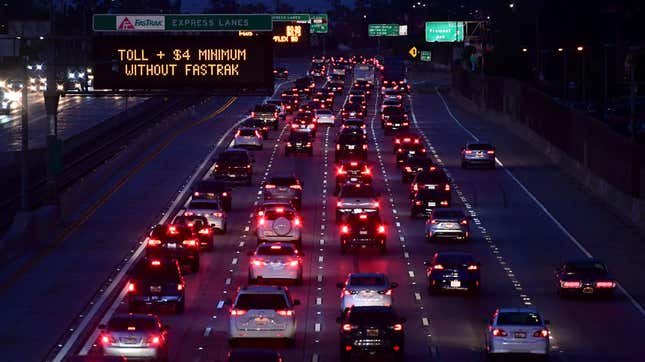
By this point, most of us are familiar with President Joe Biden’s massive transportation infrastructure plan that pours trillions of dollars into the roads in the United States, including the introduction of a comprehensive electric vehicle charging network. Now, a group of House Democrats have introduced a $547 plan to revamp surface transportation infrastructure, Reuters reports.
That’s a big change from Biden’s original $2 trillion figure, but this current plan is nowhere near as comprehensive as what Biden was proposing before. Rather, it’s something of a sub-plan—it’ll end up being part of the larger infrastructure plan, but this committee is focusing on two of the bigger issues plaguing Americans today: an outdated road network and a lack of public transportation.
Here’s a little more from the Reuters story:
House of Representatives Transportation and Infrastructure Committee Chairman Peter DeFazio said in a statement the proposal seizes on a “once-in-a-generation opportunity to move our transportation planning out of the 1950s and toward our clean energy future.”
[...]
The plan introduced by DeFazio and other senior committee Democrats would authorize $343 billion for roads, bridges and safety - including $4 billion in electric vehicle charging infrastructure. The panel will hold a June 9 hearing on the proposal to consider amendments.
DeFazio’s plan also calls for $109 billion for transit and $95 billion for rail, including tripling funding for U.S. passenger railroad Amtrak to $32 billion. It would require Amtrak to set aside at least 2.5% of all annual government funding “to enhance the passenger experience on long-distance routes.”
Part of that initiative is, of course, electric. $4.1 billion would be set aside for the buying of electric transit buses. A $500 million grant program is being designed to prevent gridlock in packed cities, and another $1 billion is dedicated to addressing the shortage of parking for commercial vehicles. And yes, there’s quite a bit more to hash out, since the plan runs on for a massive 1,249 pages.
Why revamp the roads now? The influx of EVs demands it, especially as we transition from small electric cars to larger forms of commercial transportation. The battery packs that power these machines are heavy and pose a threat to our already crumbling roadways. Yes, a charging network remains important—but we do kind of need to fix our roads before we hit that point.
Of course, there’s been pushback. House Republicans have already nicknamed the proposal “a new ‘My Way or the Highway Bill,’” citing two big issues: funding and other infrastructure concerns.
We’ll start with that last one. The argument House Republicans are making is that this bill prioritizes green energy so highly that it’s actually detrimental to other aspects of infrastructure. We’ll likely see a counterproposal and other counterarguments in the next few days.
And there’s always an issue with payment. More public works projects generally result in higher taxes, which is generally a pretty contentious issue. Whether those funds are gained by taxing commercial truck driving or raising corporate tax rates remains to be seen, but you can absolutely expect that to be a sticking point as this proposal is opened up to amendments and criticisms on June 9.